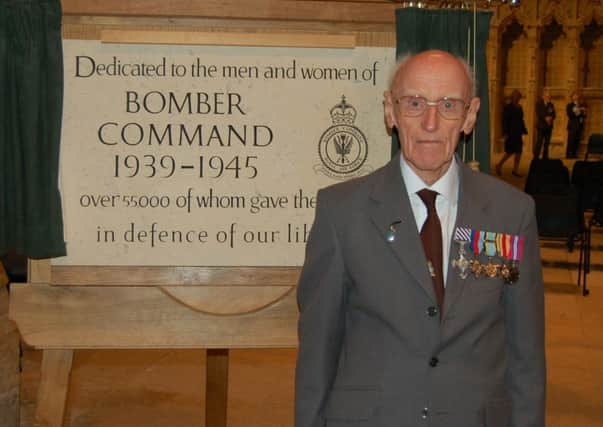James Hudson


He was awarded the Distinguished Flying Cross after completing a tour of 30 operational flights over Germany between January and June 1944.
The son of Harold and Phyllis Hudson, he was born in Whitkirk near Leeds. The family later moved to Skipton where he went to Ermystead’s Grammar School, and following another move, to Manchester Grammar School.
Advertisement
Hide AdAdvertisement
Hide AdHe had been a weak child, but by the time he was 23 in 1939, the RAF deemed him fit to fly, and he started training as an air observer – later to be known as navigator – in the RAF Manchester Volunteer Reserve.
He was called into the regular air force two days before the declaration of war.
His training completed, he was posted to 101 Squadron as a Blenheim navigator at West Raynham, Norfolk.
Over a period of seven weeks, the squadron lost 20 of these light bombers.
Advertisement
Hide AdAdvertisement
Hide AdIn late August, 1940, Mr Hudson set off on an ill-fated flight from Thorney Island near Portsmouth for Malta. With not enough fuel, the aircraft crash landed in Tunisia and the crew members were captured by the Nazi’s Vichy French collaborators.
At Le Kef they were imprisoned in filthy conditions and fed on meagre, fly-infested rations.
Mr Hudson and fellow airman Ted Hart escaped, crossed into Algeria, but were re-captured four days later, and were closely confined before being transferred to longer-term detention at the oasis town of Laghouat.
From there he escaped again, this time with 28 others, through a 60-metre tunnel dug with two breadknives.
Advertisement
Hide AdAdvertisement
Hide AdAll were quickly rounded up, and were kept 16 days in cells with no amenities other than a churn to serve as a latrine.
Captured crews of HMS Havock and HMS Manchester brought the number of POWs at Laghouat to nearly 1,000, the prisoners passing their time playing bridge, planning how to escape and digging dangerous tunnels.
Mr Hudson found an additional diversion by organising a navigation school.
The POWs were repatriated following the invasion of Algeria in 1942.
Advertisement
Hide AdAdvertisement
Hide AdIn February 1943, Mr Hudson made a train journey during a five-month rehabilitation period, and on the train met Alice Omerod.
It was the start of a relationship which eventually led to their marriage in March,1945.
His rehabilitation period completed, Mr Hudson was allowed to resume flying, and now trained on the latest radar navigational aids. He joined 100 Squadron at Waltham, near Grimsby, as a navigator on Lancaster heavy bombers.
His crew successfully completed 30 operational sorties, including three of the most costly for Bomber Command; in the raids over Leipzig, Berlin and Nuremberg. In the first three months of 1944, 249 Lancasters were lost.
Advertisement
Hide AdAdvertisement
Hide AdIn his abbreviated memoir The Best of Douglas, A navigator’s story, the author records that in total, more than 1,500 heavy bombers were downed in those three months, with the loss of over 10,500 aircrew.
In addition to his operational flying, Mr Hudson carried out instructional missions, teaching navigators how to use the new radar equipment.
After the war, he became wholesale director for a Birmingham company and after a spell in London, in 1975 moved to the West Country as area sales representative for an expanding Leeds company from which he retired in 1987.
At home he and his wife gardened, and were self-sufficient in fruit and vegetables.
Advertisement
Hide AdAdvertisement
Hide AdThey eventually settled in Heighington near Lincoln, and following the death of his wife in 2004, he assumed a personal mission to increase the younger generation’s awareness of the sacrifices made on their behalf by those who served and died during the Second World War and he became a prolific speaker.
He continued to expand his book There and Back Again – A Navigator’s Story, first published in 2001, creating a total of six editions and published three other books, Destined to Fly Again, Just Douglas, and a children’s story book.
He would become a familiar figure –at the East Kirkby Aviation Heritage Centre where he assiduously sold copies of his books to its visitors.
He was made an honorary member of the Battle of Britain Memorial Flight at RAF Coningsby, and having campaigned for a memorial in Lincoln Cathedral to those who lost their lives in Bomber Command, in 2006 was nominated to jointly unveil the Memorial Ledger Stone at the entrance to the Airmen’s Chapel.
Mr Hudson is survived by his daughters Ann and Yvonne, three grandchildren and a great granddaughter.